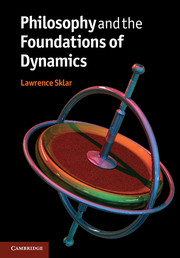Book contents
- Frontmatter
- Contents
- Chapter 1 Introduction
- Chapter 2 The pre-history of classical dynamics
- Chapter 3 The astronomical revolution
- Chapter 4 Precursors to Newtonian dynamics
- Chapter 5 The Newtonian synthesis
- Chapter 6 Philosophical aspects of the Newtonian synthesis
- Chapter 7 The history of statics
- Chapter 8 The development of dynamics after Newton
- Chapter 9 The “Newtonian” approach after Newton
- Chapter 10 From virtual work to Lagrange's equation
- Chapter 11 Extremal principles
- Chapter 12 Some philosophical reflections on explanation and theory
- Chapter 13 Conservation principles
- Chapter 14 Hamilton's equations
- Chapter 15 Canonical transformations, optical analogies and algebraic structures
- Chapter 16 The search for new foundations
- Chapter 17 New directions in the applications of dynamics
- Chapter 18 Spacetime formulations of Newtonian dynamics
- Chapter 19 Formalization: mass and force
- Chapter 20 Relationist dynamics
- Chapter 21 Modes of explanation
- Chapter 22 Retrospective and conclusions
- References
- Index
Chapter 5 - The Newtonian synthesis
Published online by Cambridge University Press: 05 December 2012
- Frontmatter
- Contents
- Chapter 1 Introduction
- Chapter 2 The pre-history of classical dynamics
- Chapter 3 The astronomical revolution
- Chapter 4 Precursors to Newtonian dynamics
- Chapter 5 The Newtonian synthesis
- Chapter 6 Philosophical aspects of the Newtonian synthesis
- Chapter 7 The history of statics
- Chapter 8 The development of dynamics after Newton
- Chapter 9 The “Newtonian” approach after Newton
- Chapter 10 From virtual work to Lagrange's equation
- Chapter 11 Extremal principles
- Chapter 12 Some philosophical reflections on explanation and theory
- Chapter 13 Conservation principles
- Chapter 14 Hamilton's equations
- Chapter 15 Canonical transformations, optical analogies and algebraic structures
- Chapter 16 The search for new foundations
- Chapter 17 New directions in the applications of dynamics
- Chapter 18 Spacetime formulations of Newtonian dynamics
- Chapter 19 Formalization: mass and force
- Chapter 20 Relationist dynamics
- Chapter 21 Modes of explanation
- Chapter 22 Retrospective and conclusions
- References
- Index
Summary
The background to the Principia
In Newton's great work dynamics is presented as being derivable in a systematic way from a small number of fundamental first principles. In this Newton resembles Descartes. But, unlike Descartes, the first principles are not alleged to be derivable a priori from “clear and distinct ideas.” They are, rather, painstakingly inferred from the known lower-level generalizations, themselves inferred from observation and experiment, as the best basic principles from which the known phenomena can be derived. And, very much unlike Descartes, and very much in the tradition of Galileo and Huyghens, Newton is extraordinary in his ability to apply the methods of mathematics to the description of particular dynamical situations so that detailed and exact characterizations of the situation can be formulated, and precise predictions made.
Newton's Principia appeared only after many years of the careful exploration of dynamics and its applicability to a theory of the world by its author. Most of this earlier work remained unpublished. There seem to be several reasons for this, including many forays by Newton into other fields, such as the invention of the calculus, brilliant experiments on light, including the discovery of the dispersion of white light into colors and basic interference phenomena, and such matters as the invention of the reflecting telescope. Newton's sensitivity to what he took to be inappropriate criticism of early public work may have also contributed to a reluctance on his part to publish.
- Type
- Chapter
- Information
- Philosophy and the Foundations of Dynamics , pp. 46 - 56Publisher: Cambridge University PressPrint publication year: 2012



